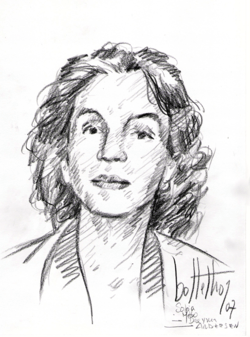Sophia de Mello Breyner Andresen

Sophia de Mello Breyner Andresen (November 6, 1919 in Porto – July 2, 2004 in Lisbon) was an award-winning Portuguese poet and writer. In 2014, she was unanimously chosen by the Parliament with National Pantheon honours, the second woman to be so honored, after Amália Rodrigues.[1]
Sophia, as she is often referred to in Portugal, was born in Porto to a wealthy aristocratic family. She inherited the surname 'Andresen' from her paternal great grandfather, a Danish merchant. She received a strict Catholic upbringing, and was to remain a fervent believer until the end of her life. After spending her childhood in Porto she moved to Lisbon, where she attended the Universidade de Lisboa. As a student, she was activelly involved in Catholic movements. Politically, she defended constitutional monarchy and openly criticized Salazar's dictatorship. In 1946 she married lawyer and politician Francisco Sousa Tavares. They had five children, among whom is journalist and best-selling author Miguel Sousa Tavares. After the Carnation Revolution in 1974, she made a brief incursion into politics as an MP for the Socialist Party (centre-left).
Andresen won acclaim as a storyteller with Contos Exemplares (Exemplary Tales),"Histórias da Terra e do Mar" (Stories of Land and Sea), and a number of children's books – A Menina do Mar (The Sea Girl), O Cavaleiro da Dinamarca (The Danish Knight), A Floresta (The Forest), O Rapaz de Bronze (The Bronze Boy), A Fada Oriana (The Fairy Oriana). She also published several poetry books and anthologies, including: Poesia, Dual, Livro Sexto, Coral, Dia do Mar, No Tempo Dividido, Grades, O Nome das Coisas, As Ilhas, Antologia, Geografia, Navegações, O Búzio de Cós. In 1999 she became the first woman to receive the highest Portuguese award for poetry, the Prémio Camões. She was also awarded the Max Jacob Poetry Prize,in 2001, and the Spanish Prémio Reinha Sofia in 2003.
"Poetry," she explained, "is my understanding of the universe, my way of relating to things, my participation in reality, my encounter with voices and images. This is why the poem speaks not of an ideal life but of a concrete one: the angle of a window, the resonance of streets, cities and rooms, the shadow cast by a wall, a sudden face, the silence, distance and brightness of the stars, the night’s breath, the scent of linden and of oregano." The sea is probably the most central theme in her poetical works. Other recurring themes are Ancient Greece and ideas of freedom and justice.
Besides her work as a writer, she translated Dante and Shakespeare into Portuguese.
A documentary short film about her was produced in 1969. It was the first completed film by director João César Monteiro (then using the name João César Santos).[2]
Sophia de Mello Breyner Andresen died in Lisbon on July 2, 2004, aged 84.
Her poetry has been translated into English by Ruth Fainlight, Richard Zenith and most recently by Colin Rorrison with Margaret Jull Costa, as well as into most languages in the world.
English translations
- Marine Rose: Selected Poems tr. Ruth Fainlight (1987, Black Swan)
- Log Book: Selected Poems, tr. Richard Zenith (1997, Carcanet)
- The Perfect Hour, tr. Colin Rorrison with Margaret Jull Costa (2015, Cold Hub Press)
Awards
- In 1964 Grand Prize for Poetry by the Portuguese Writers Society for her book Livro Sexto (The Sixth Book).
- In 1977 Teixeira de Pascoaes Prize for her book O Nome das Coisas (The Name of Things).
- In 1983 Critics' Prize by the International Association of Critics for the full set of her work.
- In 1989 King Diniz Prize by the Casa de Mateus Foundation for her book Ilhas (Islands).
- In 1990 Grand Prize for Poetry by both Inasset/Inapa and Pen Club for her book Ilhas (Islands).
- In 1992 Calouste Gulbenkian's Grand Prize for Literature for Children by the Calouste Gulbenkian Foundation for the full set of her work.
- In 1994 "Vida Literária" (Literary Life) Prize by the Portuguese Association of Writers.
- In 1995 Honour Plaque of the Petrarca Prize by the Italian Association of Editors.
- In 1998 Luís Miguel Nava Foundation Prize for her book O Búzio de Cós e Outros Poemas.
- In 1999 the Camões Prize for Portuguese language literature.
- In 2003 the Reina Sofia Prize for writers of Portugal, Spain and Latin America.
References
- ↑ "National Pantheon opens this Wednesday the doors to the poetic and civic grandeur of Sophia". Publico newspaper (in Portuguese). July 2, 2014. Retrieved November 5, 2014.
- ↑ Paulo Felipe Monteiro, "An Art in the Rough: The Cinema of João César Monteiro", in Lucia Nagib, Anne Jerslev, eds., Impure Cinema: Intermedial and Intercultural Approaches to Film (I.B.Tauris, 2013), ISBN 978-1780765112, p. 152. Excerpts available at Google Books.
- ↑ http://www.coldhubpress.co.nz/the-perfect-hour-sophia-de-mello-cold-hub-press-----.html
- ↑ https://www.facebook.com/ColdHubPress
External links
| Wikimedia Commons has media related to Sophia de Mello Breyner Andresen. |
- Sophia de Mello Breyner Andresen profile in Poetry International web
- Sophia de Mello Breyner Andresen at the Internet Movie Database